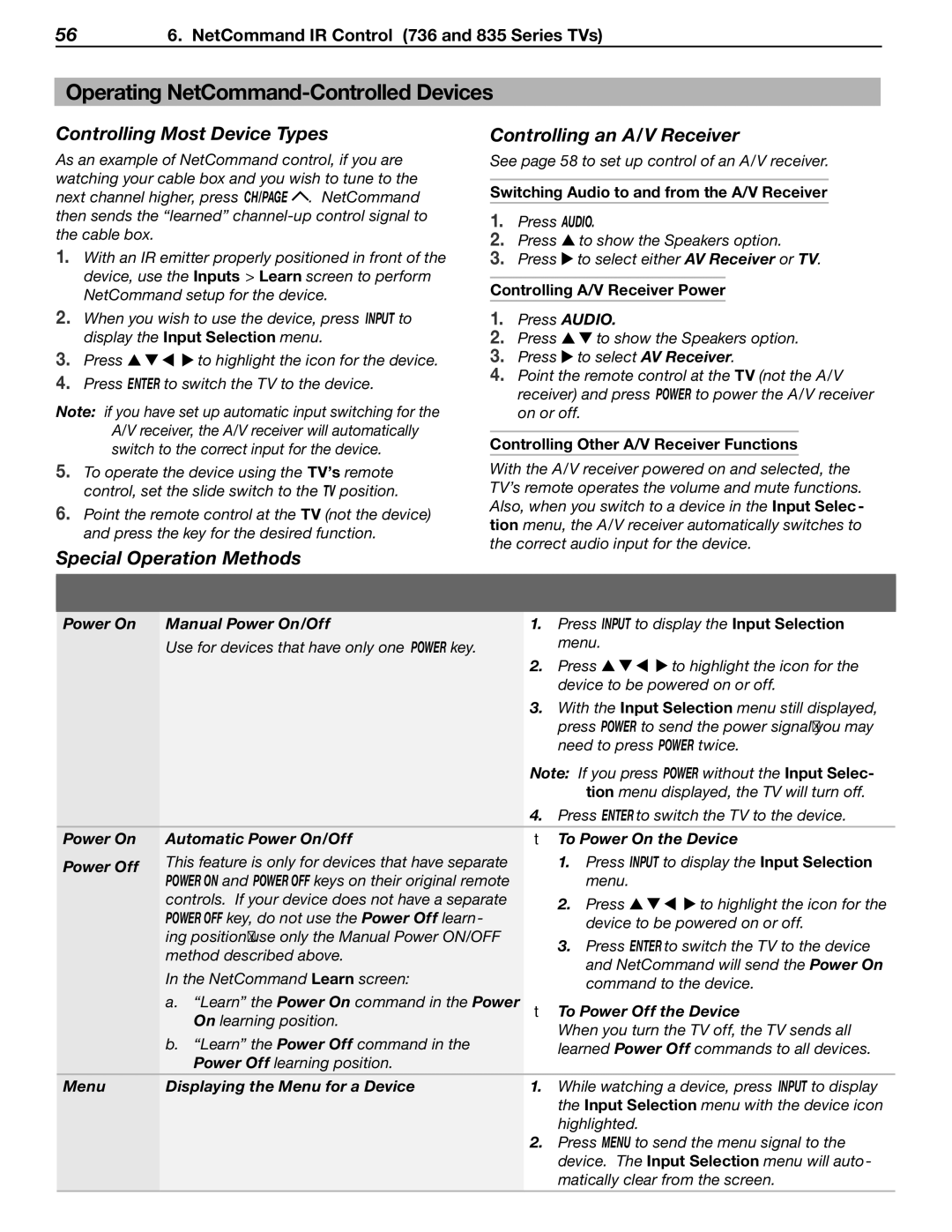
566. NetCommand IR Control (736 and 835 Series TVs)
Operating NetCommand-Controlled Devices
Controlling Most Device Types
As an example of NetCommand control, if you are watching your cable box and you wish to tune to the next channel higher, press CH/PAGE ![]() . NetCommand then sends the “learned”
. NetCommand then sends the “learned”
1.With an IR emitter properly positioned in front of the device, use the Inputs > Learn screen to perform NetCommand setup for the device.
2.When you wish to use the device, press INPUT to display the Input Selection menu.
3.Press ![]()
![]()
![]()
![]() to highlight the icon for the device.
to highlight the icon for the device.
4.Press ENTER to switch the TV to the device.
Note: if you have set up automatic input switching for the A/V receiver, the A/V receiver will automatically switch to the correct input for the device.
5.To operate the device using the TV’s remote control, set the slide switch to the TV position.
6.Point the remote control at the TV (not the device) and press the key for the desired function.
Special Operation Methods
Controlling an A/V Receiver
See page 58 to set up control of an A/V receiver.
Switching Audio to and from the A/V Receiver
1.Press AUDIO.
2.Press ![]() to show the Speakers option.
to show the Speakers option.
3.Press ![]() to select either AV Receiver or TV.
to select either AV Receiver or TV.
Controlling A/V Receiver Power
1.Press AUDIO.
2.Press ![]()
![]() to show the Speakers option.
to show the Speakers option.
3.Press ![]() to select AV Receiver.
to select AV Receiver.
4.Point the remote control at the TV (not the A/V receiver) and press POWER to power the A/V receiver on or off.
Controlling Other A/V Receiver Functions
With the A/V receiver powered on and selected, the TV’s remote operates the volume and mute functions. Also, when you switch to a device in the Input Selec- tion menu, the A/V receiver automatically switches to the correct audio input for the device.
Key Name in | Special Operation Description and Setup | How to Use |
| ||
Learning Screen |
| ||||
|
|
|
| ||
Power On | Manual Power On/Off | 1. | Press INPUT to display the Input Selection | ||
| Use for devices that have only one POWER key. |
| menu. |
| |
|
| 2. | Press | to highlight the icon for the | |
|
|
| device to be powered on or off. | ||
|
| 3. | With the Input Selection menu still displayed, | ||
|
|
| press POWER to send the power signal; you may | ||
|
|
| need to press POWER twice. | ||
|
| Note: If you press POWER without the Input Selec- | |||
|
|
|
| tion menu displayed, the TV will turn off. | |
|
| 4. | Press ENTER to switch the TV to the device. | ||
|
|
|
| ||
Power On | Automatic Power On/Off | • | To Power On the Device | ||
Power Off | This feature is only for devices that have separate |
| 1. | Press INPUT to display the Input Selection | |
Power On and Power Off keys on their original remote |
|
| menu. |
| |
|
|
|
| ||
| controls. If your device does not have a separate |
| 2. | Press | to highlight the icon for the |
| Power Off key, do not use the Power Off learn- |
|
| device to be powered on or off. | |
| ing position; use only the Manual Power ON/OFF |
|
| ||
|
| 3. | Press ENTER to switch the TV to the device | ||
| method described above. |
| |||
|
|
| and NetCommand will send the Power On | ||
| In the NetCommand Learn screen: |
|
| ||
|
|
| command to the device. | ||
|
|
|
| ||
| a. “Learn” the Power On command in the Power | • | To Power Off the Device | ||
| On learning position. |
| When you turn the TV off, the TV sends all | ||
| b. “Learn” the Power Off command in the |
| |||
|
| learned Power Off commands to all devices. | |||
| Power Off learning position. |
| |||
|
|
|
|
| |
|
|
|
| ||
Menu | Displaying the Menu for a Device | 1. | While watching a device, press INPUT to display | ||
|
|
| the Input Selection menu with the device icon | ||
|
|
| highlighted. |
| |
|
| 2. | Press MENU to send the menu signal to the | ||
|
|
| device. The Input Selection menu will auto- | ||
|
|
| matically clear from the screen. | ||
|
|
|
|
|
|
